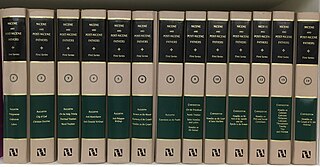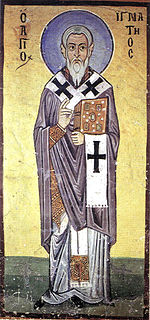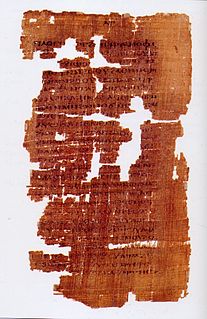Publication
The series was originally published between 1867 and 1873 by the Presbyterian publishing house T. & T. Clark in Edinburgh under the title Ante-Nicene Christian Library (ANCL), as a response to the Oxford movement's Library of the Fathers which was perceived as too Roman Catholic. The volumes were edited by Rev. Alexander Roberts and James Donaldson. This series was available by subscription, but the editors were unable to interest enough subscribers to commission a translation of the homilies of Origen.
The Library of the Fathers, more properly A library of fathers of the holy Catholic church: anterior to the division of the East and West, was a series of around 50 volumes of the Church Fathers, annotated in English translation, published 1838 to 1881 by John Henry Parker. Edited by Edward Bouverie Pusey and others including John Keble and John Henry Newman, this series of editions is closely associated with the origins of the Oxford Movement.

Rev Prof Alexander Roberts DD was a 19th-century Scottish biblical scholar.

Sir James Donaldson was a Scottish classical scholar, and educational and theological writer.
In 1885 the Christian Literature Company, first of Buffalo, then New York, began to issue the volumes in a reorganized form. This was done without permission, and was indeed a pirate edition. The new series was edited by the Episcopal bishop of New York, A. Cleveland Coxe. Coxe gave his series the title The Ante-Nicene Fathers. By 1896, this American edition/revision was complete. Unable to close down the pirate, T. & T. Clark were obliged to make what terms they could.

Buffalo is the second largest city in the U.S. state of New York and the largest city in Western New York. As of July 2016, the population was 256,902. The city is the county seat of Erie County and a major gateway for commerce and travel across the Canada–United States border, forming part of the bi-national Buffalo Niagara Region.

Arthur Cleveland Coxe was the second Episcopal bishop of Western New York. He used Cleveland as his given name and is often referred to as A. Cleveland Coxe.
In 1897, a volume 9, which contained new translations, was published by T. & T. Clark as an additional volume, to complete the original ANCL. Apart from volume 9, the contents entirely derived from the ANCL, but in a more chronological order. Coxe added his own introductions and notes, which were criticized by academic authorities and Roman Catholic reviewers.
T. & T. Clark then associated with the Christian Literature Company and with other American publisher for the publication of the Nicene and Post-Nicene Fathers .

A Select Library of the Nicene and Post-Nicene Fathers of the Christian Church, usually known as the Nicene and Post-Nicene Fathers (NPNF), is a set of books containing translations of early Christian writings into English. It was published between 1886 and 1900. Unlike the Ante-Nicene Fathers which was produced by using earlier translations of the Ante-Nicene Christian Library (ANCL), the Nicene and Post-Nicene Fathers was printed simultaneously in Europe and in America, by T. & T. Clark, by Christian Literature Company and other American editors. T. & T. Clark was surely convinced by the commercial success of the cheaper American version/revision of the ANCL, although of lesser quality on some minor points. An American, Philip Schaff, was commissioned to supervise the first series of the NPNF. He was joined by the British Henry Wace for the second series.

Ignatius of Antioch, also known as Ignatius Theophorus or Ignatius Nurono, was an early Christian writer and bishop of Antioch. En route to Rome, where he met his martyrdom, Ignatius wrote a series of letters. This correspondence now forms a central part of the later collection known as the Apostolic Fathers. His letters also serve as an example of early Christian theology. Important topics they address include ecclesiology, the sacraments, and the role of bishops.

Hippolytus was one of the most important second-third century Christian theologians, whose provenance, identity and corpus remain elusive to scholars and historians. Suggested communities include Palestine, Egypt, Anatolia, Rome and regions of the mideast. The best historians of literature in the ancient church, including Eusebius of Caesarea and Jerome, openly confess they cannot name where Hippolytus the biblical commentator and theologian served in leadership. They had read his works but did not possess evidence of his community. Photios I of Constantinople describes him in his Bibliotheca as a disciple of Irenaeus, who was said to be a disciple of Polycarp, and from the context of this passage it is supposed that he suggested that Hippolytus so styled himself. This assertion is doubtful. One older theory asserts he came into conflict with the popes of his time and seems to have headed a schismatic group as a rival to the Bishop of Rome, thus becoming an Antipope. In this view, he opposed the Roman Popes who softened the penitential system to accommodate the large number of new pagan converts. However, he was reconciled to the Church before he died as a martyr.

The Gospel of Nicodemus, also known as the Acts of Pilate, is an apocryphal gospel claimed to have been derived from an original Hebrew work written by Nicodemus, who appears in the Gospel of John as an associate of Jesus. The title "Gospel of Nicodemus" is medieval in origin. The dates of its accreted sections are uncertain, but according to the 1907 edition of the Catholic Encyclopedia scholars agree in assigning the resulting work to the middle of the fourth century AD.
The Apostolic Fathers were Christian theologians who lived in the 1st and 2nd centuries AD, who are believed to have personally known some of the Twelve Apostles, or to have been significantly influenced by them. Their writings, though popular in Early Christianity, were not included in the canon of the New Testament. Many of the writings derive from the same time period and geographical location as other works of early Christian literature which came to be part of the New Testament. Some of the writings found among the Apostolic Fathers appear to have been highly regarded as some of the writings which became the New Testament.
Patristics or patrology is the study of the early Christian writers who are designated Church Fathers. The names derive from the combined forms of Latin pater and Greek patḗr (father). The period is generally considered to run from the end of New Testament times or end of the Apostolic Age to either AD 451 or to the Second Council of Nicaea in 787.
T&T Clark is a British publishing firm which was founded in Edinburgh, Scotland, in 1821 and which now exists as an imprint of Bloomsbury Publishing.

The history of early Christianity covers the period from the origins of Christianity to the First Council of Nicaea in 325.
Aker is an angel mentioned in the Greek Apocalypse of Ezra whose name was revealed to Esdras as one of the nine angels who will govern "at the end of the world." The nine angels mentioned are: Michael, Gabriel, Uriel, Raphael, Gabuthelon, Aker, Arphugitonos, Beburos, and Zebuleon. Aker is not considered an archangel and is a non-canonical figure. Theologians surmise that Aker may be comparable to Kyr.
Arphugitonos is an angel mentioned in the Greek Apocalypse of Ezra whose name was revealed to Esdras as one of the nine angels who will govern "at the end of the world." The nine angels mentioned are: Michael, Gabriel, Uriel, Raphael, Gabuthelon, Aker, Arphugitonos, Beburos, and Zebuleon. Arphugitonos is not considered an archangel and is a non-canonical figure.
Beburos is an angel mentioned in the Greek Apocalypse of Ezra whose name was revealed to Esdras as one of the nine angels who will govern "at the end of the world." The nine angels mentioned are Michael, Gabriel, Uriel, Raphael, Gabuthelon, Aker, Arphugitonos, Beburos, and Zebuleon. Beburos is not considered an archangel and is a non-canonical figure.
Zebuleon is an angel mentioned in the Greek Apocalypse of Ezra whose name was revealed to Esdras as one of the nine angels who will govern "at the end of the world." The nine angels mentioned are: Michael, Gabriel, Uriel, Raphael, Gabuthelon, Aker, Arphugitonos, Beburos, and Zebuleon. Zebuleon is not considered an archangel and is a non-canonical figure.
The Ante-Nicene Period of the history of early Christianity was the period following the Apostolic Age of the 1st century down to the First Council of Nicaea in 325. This period of Christian history had a significant impact on the unity of doctrine across all Christendom and the spreading of Christianity to a greater area of the world. Those seen as prominent figures of this era, referred to as the Ante-Nicene Fathers or Proto-orthodox Christians, generally agreed on most doctrine while the teachings of those early Christian writers which the general majority considered to be heretical, were rejected.

Christianity in the 3rd century was largely the time of the Ante-Nicene Fathers who wrote after the Apostolic Fathers of the 1st and 2nd centuries but before the First Council of Nicaea in 325.
Mavilus, distinguished as Mavilus of Hadrumetum, was an early Christian martyr during the persecutions of Caracalla. He suffered martyrdom at Hadrumetum, in 212, by being thrown to wild beasts, by order of Governor Scapula.

The Church Fathers, Early Church Fathers, Christian Fathers, or Fathers of the Church were ancient and influential Christian theologians and writers. There is no definitive list. The era of these scholars who set the theological and scholarly foundations of Christianity largely ended by AD 700.
The Acts of Sharbel or the Hypomnemata of Sharbel is a Syriac Christian martyrdom text about a pagan high priest who was martyred for converting to Christianity. The setting takes place at Edessa during the fifteenth year of Roman Emperor Trajan's reign and during the third year of King Abgar VIII's reign but is dated by scholars to the 5th century AD.
The Martyrdom of Barsamya is a Syriac Christian text. The text is set at Edessa during the reign of Roman Emperor Trajan but is dated by biblical scholars to the fifth century AD.











